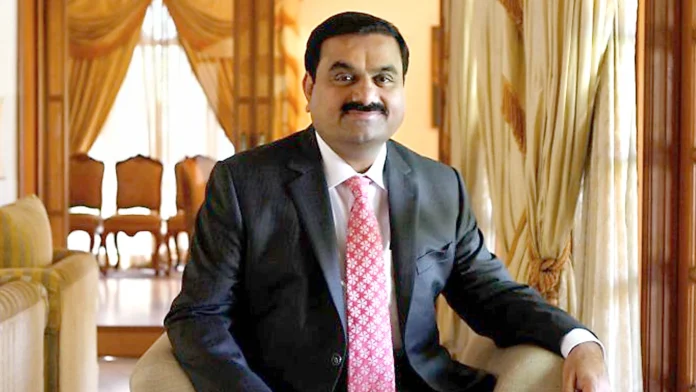The United States Department of Justice on Thursday filed a case against Indian industrialist Gautam Adani and seven others, alleging that the accused indulged in a million-dollar bribery scheme in the US to bribe Indian government officials.
The filing by the US Justice Department alleged that the bribery scheme was executed to secure contracts for an Adani company to sell solar power to Solar Energy Corporation of India Ltd (SECI), a Public Sector Undertaking owned by the Ministry of New and Renewable Energy, Government of India.
It said the company owned by Adani and a company based in US were issued Letters of Award (LOA) between December 2019 and July 2020 for a manufacturing-linked tender offered by the SECI.
As per the award, the US company was to supply four gigawatts and the Adani company was to provide eight gigawatts of solar power to SECI. On its part, the Government of India-owned PSU had to find state distribution companies that would purchase this 12 gigawatts of solar power.
The filing said the high prices allegedly quoted in the Letters of Award made it difficult for the SECI to find state buyers for the solar power to be supplied by the Adani & US companies.
Gautam Adani, along with Adani company executives Sagar Adani & Vneet Jaain and certain other officials of the US company, reportedly devised a scheme to bribe Indian government officials in exchange for the SECI making state companies agree to purchase the power sold by the PSU.
If SECI could execute Power Sale Agreements (PSA) with the state companies, the Adani/US companies would execute Power Purchase Agreements (PPA) with the PSU.
The US Department of Justice said the SECI’s inability to find purchasers jeopardised the lucrative LOAs and corresponding revenue that the Indian energy company’s subsidiary and the US Issuer anticipated receiving from the Manufacturing Linked Project (MLP).
As a result, in around 2020, defendants Gautam Adani, Sagar Adani, Vneet Jaain, Ranjit Gupta and Co-Conspirator number 2, among others, devised a scheme to offer, authorise, and make bribe payments to Indian government officials in exchange for the government officials causing state electricity distribution companies to enter into Power Sale Agreements with SECI, which would allow the Indian energy company’s subsidiaries and the US Issuer to secure PPAs with SECI, it added.
The US agency alleged that Gautam Adani and others offered around Rs 2,209 crore as bribe to Indian government officials. Around Rs 1750 crore was offered to one official to persuade a power distribution company in Andhra Pradesh to purchase 7 gigawatts of power from SECI.
It stated that following the promise of bribes to Indian government officials, in between July 2021 and February 2022, electricity distribution companies for the states and regions of Odisha, Jammu & Kashmir, Tamil Nadu, Chhattisgarh, and Andhra Pradesh entered into PSAs with SECI under the MLP.
Electricity distribution companies from Andhra Pradesh entered into a PSA with SECI on or around December 1, 2021, pursuant to which the state agreed to purchase around seven gigawatts of solar power, by far the largest amount of any Indian state or region, it added.
The US agency further said that with executed PSAs under the MLP, SECI could enter into corresponding PPAs to purchase solar power from the Indian Energy Company’s subsidiaries and the US Issuer. Somewhere between October 2021 and February 2022, the US Issuer and the Indian energy company, through subsidiaries, executed PPAs with SECI.
The US Issuer, pursuant to the PPAs, agreed to supply SECI with around 650 megawatts of solar power for the Indian states and regions of Chhattisgarh, Tamil Nadu, Odisha, and Jammu and Kashmir (collectively, 650 MW PPAs). the US Issuer further agreed to supply around 2.3 gigawatts of solar power to Andhra Pradesh (2.3 GW PPAs).
Similarly, the subsidiaries of the Indian energy company executed their own PPAs with SECl, under which the subsidiaries agreed to supply SECI with solar power for the Indian states and regions of Chhattisgarh, Tamil Nadu, Odisha, Jammu & Kashmir, and Andhra Pradesh.
It alleged that these activities violated the Foreign Corrupt Practices Act (FCPA) and the Foreign Extortion Prevention Act (FEPA).
The FCPA was enacted by US Congress for the purpose of, among other things, making it unlawful for certain classes of persons and entities to act corruptly in furtherance of an offer, promise, authorisation or payment of money or anything of value, directly or indirectly, to a foreign official for the purpose of obtaining or retaining business for, or directing business to, any person.
The US agency accused Adani and others of conspiring to misrepresent the company’s anti-bribery practices to US-based investors and concealing from them their bribery of Indian officials.
The United States Attorney Peace said that the defendants orchestrated an elaborate scheme to bribe Indian government officials to secure contracts worth billions of dollars. Gautam Adani, Sagar Adani and Vneet Jaain lied about the bribery scheme as they sought to raise capital from the US and international investors.
Deputy Assistant Attorney General Miller said that this indictment alleged schemes to pay over USD 250 million in bribes to Indian government officials, to lie to investors and banks to raise billions of dollars, and to obstruct justice.
The offences were allegedly committed by senior executives and Directors to obtain and finance massive state energy supply contracts through corruption and fraud at the expense of US investors. The Criminal Division would continue to aggressively prosecute corrupt, deceptive, and obstructive conduct that violated the US law, no matter where in the world it occurred, it added.
FBI Assistant Director in Charge Dennehy said that Gautam S Adani and seven other business executives allegedly bribed the Indian government to finance lucrative contracts designed to benefit their businesses.
Adani and other defendants also defrauded investors by raising capital on the basis of false statements about bribery and corruption, while other defendants allegedly attempted to conceal the bribery conspiracy by obstructing the government’s investigation, he added.


